- Home
- Joy Fielding
Heartstopper Page 3
Heartstopper Read online
Page 3
“You sure you can handle it?” Victor asked with a smirk. He glanced toward the similarly outfitted diva in the seat beside him. The girl, whose name was Nancy, and whose thinly plucked left eyebrow was pierced with three small safety pins, stuck out her tongue.
Sandy winced. She couldn’t bear the sight of the metal stud jutting out from the middle of Nancy’s tongue. It looked too painful. And didn’t the girl worry about infection? Didn’t her parents? Sandy suppressed a second sigh. She considered herself lucky that neither of her children had seen fit to disfigure themselves with stray piercings or tattoos. At least so far.
“I’ll risk it,” she told Victor. “I’m sure you have some very interesting observations to share with the class.” If he was thinking about shooting up the school, she might as well have some advance warning, she reasoned as she walked around her desk, then sank into her chair, waiting, and wondering when this whole Goth fad was finally going to run its course. Hadn’t it been around long enough? Certainly she’d seen enough of it in Rochester, and while she recognized it was largely a rebellion of style over substance, it troubled her nonetheless. Still, she couldn’t help but like Victor, in spite of his ghoulish getup. Unlike most of her students, he possessed an active and fertile imagination, and his compositions, filled with often bizarre and exotic imagery, could usually be relied on to be, if not as provocative as he might have wished, at least moderately interesting.
“You want me to stand up?” Victor hovered several inches above his seat.
“Not necessary.”
Immediately he lowered his skinny backside into his chair. He paused, cleared his throat, then paused again. “‘It’s a full moon,’” he began, reading without expression or inflection. “‘I’m lying here in bed, listening for the howling of the wolves.’”
“There aren’t any wolves in Florida, dipshit,” Joey Balfour called out from the back of the class. Joey was the nineteen-year-old captain of the football team, who was repeating his senior year. He was a strutting stereotype—big, brawny, and brainless—and altogether way too proud of it.
The rest of the class laughed. A paper airplane flew across the room.
“Dipshit,” Victor repeated quietly, but with just enough venom to recapture the class’s attention. “I was talking metaphorically.”
Joey laughed, lifting large hands in front of his wide face, as if trying to shield himself. “Whoa. I didn’t understand. He was talking met-a-phor-i-cally.”
“That’s a pretty big word for such a scrawny little guy,” Greg Watt said, his smile curdling, his voice growing dark.
“Does somebody want to tell the class what it means?” Sandy interjected, hoping to ward off an actual confrontation. She’d taught a whole lesson on metaphors earlier in the year. It would be nice to find out if anybody had actually been paying attention.
Delilah raised her hand.
Wouldn’t you know it? Sandy thought. Not only did she have to have this oversize reminder of her husband’s betrayal staring her in the face first thing every morning, but now the misguided young woman actually felt the need to contribute. Didn’t she know that every time she opened her mouth, it was like a dagger to Sandy’s heart? Talk about metaphors, she thought, shaking her head and dislodging the hair she’d just tucked behind her ear, realizing, technically, it was a simile. “Go ahead, Dee,” she said.
“Dee?” Greg repeated incredulously. “Dee?! Hey, if you’re gonna give her a nickname, how about Deli? Yeah, that’s better. God knows she could eat everything in one.”
Once again, the class erupted in laughter. But unlike Victor, Delilah had no quick comeback, no clever retort.
“That’s enough,” Sandy warned.
“Tell that to the Deli,” Joey Balfour shouted from the back of the room. A fresh wave of laughter swept through the class.
“Or how about Big D?” Greg continued. “You know, like the song—”
“I said, that’s enough.”
Delilah lowered her head, creating an unfortunate double chin. Sandy felt immediately guilty. The poor girl had enough problems without being saddled with a nickname that was worse than the real thing. What had she done? It wasn’t the teenager’s fault that her mother had seduced Sandy’s husband during an intimate online chat. It wasn’t her fault that Ian had grown restless and dissatisfied being the proverbial small fish in a big pond, that he’d yearned to be a bigger fish in a smaller pond.
Make that the biggest fish, Sandy amended. The smallest pond.
Make that frog, she amended further. Make that quagmire.
“Okay. No more of that. Unless you all want to stay late after class.” Immediately the room fell silent. No need for clever retorts when you had power. “Delilah,” Sandy encouraged.
“That’s all right. I like Dee,” Delilah said in the soft, little-girl voice that never failed to surprise Sandy. The voice seemed years—not to mention pounds—removed from the person speaking.
“Okay, then … Dee. Tell us what a metaphor is.”
“It’s a symbol,” Delilah began. “A comparison. Like when you use a word or phrase that normally means one thing to mean something else.”
“What the hell is she talking about?” Greg asked.
“It means Victor wasn’t actually lying in bed listening for wolves howling,” Brian Hensen answered without looking up from his desk. Brian was the sickly son of the school nurse, and his complexion was as pale naturally as Victor’s was after half a jar of powder.
“Then what does he mean, smart-ass?”
“He’s listening for things that go bump in the night,” Brian answered matter-of-factly. “For danger.” He raised his eyes to Sandy’s. “For death.”
“Wow,” said Victor.
“Cool,” said Greg.
Then, for several seconds, no one said anything. “Thank you, Brian,” Sandy managed to whisper, fighting the urge to give both Victor and Brian a huge hug. Maybe she was contributing something after all. Maybe her months here hadn’t been a complete and utter waste of time, as she’d lamented on more than one occasion. Maybe somebody was actually learning something. “Victor, please continue reading your journal.”
Again Victor cleared his throat, then paused several seconds for dramatic effect. “‘Of course I know there aren’t any wolves in Florida,’” he read, an audible sneer in his voice as he glanced toward Joey. “‘But that doesn’t stop me from imagining them gathering outside my room. Will they be there later? I wonder. Will they be waiting for me, as I sneak from my warm bed into the cool darkness of the night? Will they follow me into the forest as I shed my skin, like the thin snake that slithers across my bare toes in the moonlight?’”
“What forest, dipshit?”
“Joey …,”Sandy warned.
“Don’t tell me. It’s another metaphor.”
“‘I find a quiet piece of damp earth,’” Victor continued without prompting. “‘I take the kitchen knife from my belt. I run the serrated edge of the blade along the inside of my arm, watch as blood bubbles to the surface of my skin, like lava from a volcano. I lower my lips, taste my sins, drink my unclean desires.’”
“You’re a nut bar,” Joey pronounced.
This time, despite the literary merits of what she’d just heard, Sandy was inclined to agree with Joey’s assessment. “Okay, Victor. I think we’ve heard enough. Much as I admire the skill with which you’re able to express your fantasies, this was supposed to be an exercise in recording what you actually did last night.”
Victor’s response was to extend his left arm and roll up the sleeve of his black shirt, revealing a long, jagged line that traveled up the underside of his flesh.
“Cool,” said Nancy.
“Holy crap,” said Greg.
“I think you better have the nurse take a look at that,” Sandy said, closing her eyes to the sight.
Victor laughed. “What for? I’m fine.”
“I’m not so sure,” Sandy countered. “Please, go see Mrs. Hen
sen. Now.” She made a mental note to call Victor’s parents at the end of the day, alert them to their son’s nocturnal activities. Was it possible she’d be telling them something they didn’t already know?
Mind your own business, she could hear Ian scold. He’d always said she got too caught up in the lives of her students. Worry about your own life, he’d said.
Except at the time he’d said it, she hadn’t realized she had anything to worry about.
“Crazy faggot,” Greg muttered as Victor opened the door of the portable classroom and vaulted over the three steps to the pavement.
“Okay, Greg,” Sandy said, jumping to her feet and almost knocking over her chair. “That’s quite enough of that.” She returned to her former position at the front of the desk. “And since you seem so eager to speak, let’s hear what you wrote.”
“Uh, it’s kind of personal, Mrs. Crosbie. Wouldn’t want to embarrass you.”
“That’s all right. I’m not easily embarrassed.”
Greg looked slyly in Delilah’s direction. “I guess not.”
The rest of the class, except for Delilah, joined in, although there were a few gasps from some of the girls. “Can I see your journal please, Greg?” Sandy’s tone indicated this was not a request.
Reluctantly, Greg handed it over. Sandy opened the notebook, her eyes scanning the collection of mostly blank, lined pages. She flipped to the last page and was surprised to find it covered with a series of amazingly good, cartoonlike sketches of instantly recognizable people. There was Lenny Fromm, the so-laid-back-he-was-almost-supine principal of Torrance High, pictured with his blond comb-over almost completely covering his sleepy features; Avery Peterson, the science teacher, who, at thirty-eight, was the same age as Sandy, but who looked much older since he was almost completely bald, and who was portrayed in these drawings as an enormous bowling ball perched atop a pair of tiny, spiderlike legs; and Gordon Lipsman, the drama teacher, represented here by a square, boxlike head containing a large, bulbous nose, and a pair of vaguely crossed eyes.
Sandy was both flattered and appalled to find herself included in the group. She recognized herself immediately in the unruly curls of the caricature’s hair, the exaggerated point of her chin, the pronounced mole that nestled above her full upper lip. The sticklike torso was covered in a long, shapeless dress, and thin arms waved bony fingers high above her head. Is that how they see me? she wondered, scanning the curious faces of her students. A skinny, frazzled harridan?
Is that how Ian saw me?
Her eyes drifted toward the page beside it, where the frazzled harridan was fighting with an Amazon whose gigantic breasts, flowing blond hair, and high-heeled shoes clearly identified her as Kerri Franklin. In the background was a monstrous-sized girl, tears leaping from bulging eyes as she attempted to stuff an entire chicken into her gaping mouth. A second sketch showed the triumphant Amazon holding a man with an enormous erection above her flowing blond mane, her high heels digging into the shapeless form of the prone harridan at her feet, as the monstroussized girl reached for another chicken, this one alive and squawking.
Sandy closed the notebook, returned it to Greg without comment. Her heart was beating wildly. But it was important to appear calm, she was thinking, even as she felt a scream rising in her throat. “Tanya,” she said, suppressing both the scream and the threat of tears as she turned her attention to one of the prettiest girls at Torrance High. “Could we hear from you, please?” Sandy forced a smile onto her lips, gratified by how unruffled she’d managed to sound.
Tanya McGovern rose in her seat. Along with Ginger Perchak, who sat two seats over and to the left, and the absent Liana Martin, who normally sat directly behind her, the three girls formed the most popular clique in school. The boys fought for their attention. The other girls emulated their hairstyles, clothes, and attitudes. Even Sandy’s normally sensible seventeen-year-old daughter, Megan, had recently fallen under their spell. At home it was always, Tanya this, and Ginger that. Sandy shuddered, wondering how long it would be before Megan requested a MOVE, BITCH T-shirt, like the one Liana had been wearing yesterday. Where are the parents? she wondered, as she had wondered earlier.
“I’m afraid I didn’t exactly get around to writing in my diary, Mrs. Crosbie.”
Sandy nodded, acknowledging defeat. “Okay, Tanya. You can sit down.”
The girl quickly complied.
“All right. It looks as if you’ve all got a busy night ahead of you,” Sandy told them. “In addition to writing two journal entries—and handing them in at the start of tomorrow’s class—there’ll be a test on the first chapter of Cry, the Beloved Country. Anyone who is absent or who fails to complete the assignment will receive a zero.”
A cascade of groans rumbled toward Sandy’s desk. “What if we’re sick?” someone whined from the back of the room.
“Don’t be.”
“What if we get a note from Dr. Crosbie?” Joey Balfour asked. Once again, several gasps punctuated the laughter that followed.
Mercifully, the bell sounded. Immediately the students jumped to their feet, began fleeing the room. Sandy remained where she was, praying her feet would support her until everyone was gone. “Tanya,” she managed to spit out as the girl was hurrying by.
“Yes, Mrs. Crosbie?”
“Maybe you could tell Liana about tomorrow’s assignment?”
“Sure thing, Mrs. Crosbie.”
“And, Greg,” Sandy added, catching him at the door. “Could I talk to you a minute, please?”
Greg backed away from the door, slowly retraced his steps.
“Catch you later, buddy,” Joey Balfour said on his way out. He winked at Sandy. “Be gentle.”
“I’m sorry about those drawings,” Greg began. “Obviously I didn’t mean for you to see them.”
“Then you might consider leaving them at home next time you come to class.”
“Yes, ma’am.”
“You might also consider applying to art college after you graduate,” Sandy continued, as Greg’s eyes shot to hers. “You have talent. Real talent. It should be developed.”
“We’re a family of truck farmers, Mrs. Crosbie,” Greg said, blushing at the compliment, then brushing it aside. “I don’t think my father would take too kindly to a son who draws cartoons for a living.”
“Well … something to think about anyway.”
“We’re not exactly big thinkers,” Greg said with a wink. He started back toward the door.
“Greg …?”
Again he stopped, swiveled around on the worn heels of his brown leather boots.
“Go easy on Delilah, would you?”
A sly grin skewered Greg’s generically handsome face. The door to the portable opened, and Greg Watt disappeared in a flash of morning sun.
THREE
Deputy Sheriff John Weber sat behind the massive oak desk in his small office and leaned back in his uncomfortable, hunter-green leather chair. The chair was uncomfortable for two reasons. First, the delicate, Italian design, selected by his wife after perhaps one too many glasses of wine at lunch, was incompatible with his expansive, American frame. (He stood six feet five inches and weighed more than two hundred pounds, and while he used to boast it was two hundred pounds of pure muscle, that was three years and thirty pounds ago.) Second, despite the old building’s spanking new air-conditioning system, which kept the temperature of his office hovering around freezing, the leather somehow always managed to stick to his back. Every time he shifted position, the leather would rip away from his shirt like a Band-Aid, leaving creases in the once crisp, beige cotton. As a result, John always looked vaguely unkempt. His wife, Pauline, complained that people no doubt attributed his slovenly appearance to her poor ironing skills. “They’ll think I just lie in bed all day, drinking and watching TV,” she once whined, a lament that might have been funny had it not been perilously close to the truth. As far as John Weber could tell, lying in bed, drinking and watching TV, was exactly what h
is wife of nearly sixteen years did with her days.
John stared out the long window that occupied the west wall of his office and wondered how long he could put off going home. Almost everybody else had already left. Only a skeletal staff remained, since nothing much ever happened in Torrance after dark, other than the occasional traffic accident or an impromptu outbreak of fisticuffs. It was almost six o’clock now, and if he stuck around another hour or so, there was a good chance that the frustrations of the day would be offset by a glorious sunset. And John loved the sunset. Not just because the spray of brilliant oranges, pinks, and yellows spattered across the turquoise blue of the sky was so achingly beautiful it made his heart sing, but because the whole process was so wondrously tidy. Having spent most of the last twenty years cleaning up other people’s messes, forty-five-year-old John Weber had developed a profound appreciation for all things neat.
Of course, if he stayed in his office until after the sun had set, he’d have to contend with Pauline’s familiar rant that he was never home, that he was always working, and didn’t he want to be with her? Didn’t he want to spend time with their daughter?
The answer to the first question was easy: no, he didn’t want to be with her. The answer to the second question was also no, although not so easy. Much as John Weber hated to admit it, he didn’t care much for either his wife or his only child. And while it was somewhat acceptable to dislike the woman you’d married because you were too inebriated and careless to appreciate the consequences of not wearing a condom, it was another matter entirely to dislike your own flesh and blood. Their daughter, Amber, named for the color of the wine they’d been drinking the night she was conceived, was now sixteen and already hovered close to six feet tall. She might have been a formidable presence had she not been so damn skinny, and not just normal, everyday skinny, but bones-jutting-out-from-every-angle, so-skeletal-it-made-you-nervous-just-to-look-at-her skinny. As a result, he tried not to look at her. Lately, he avoided even glancing her way, doing so only when it was unavoidable, and then trying his best not to cringe, although one time he couldn’t help himself, and she’d caught the look of horror in his eyes and run crying from the room. That was months ago, and he still felt guilty.

 The Stranger Next Door
The Stranger Next Door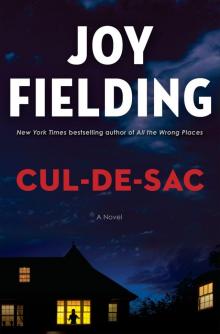 Cul-de-sac
Cul-de-sac The Final Act
The Final Act When I Looked Away
When I Looked Away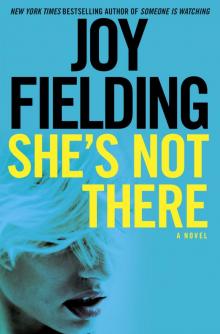 She's Not There
She's Not There All the Wrong Places
All the Wrong Places Now You See Her
Now You See Her Don't Cry Now
Don't Cry Now Good Intentions
Good Intentions Still Life
Still Life Lost
Lost The First Time
The First Time Whispers and Lies
Whispers and Lies The Other Woman
The Other Woman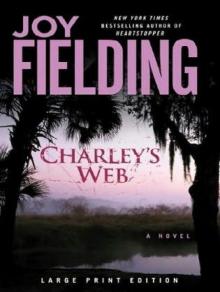 Charley's Web
Charley's Web Mad River Road
Mad River Road Puppet
Puppet Life Penalty
Life Penalty The Wild Zone
The Wild Zone Home Invasion
Home Invasion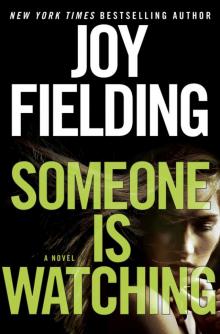 Someone Is Watching
Someone Is Watching Heartstopper
Heartstopper See Jane Run
See Jane Run The Bad Daughter
The Bad Daughter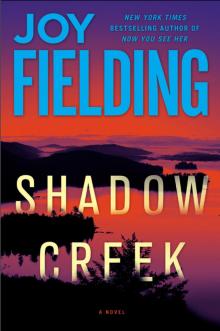 Shadow Creek
Shadow Creek Missing Pieces
Missing Pieces Kiss Mommy Goodbye
Kiss Mommy Goodbye Grand Avenue
Grand Avenue